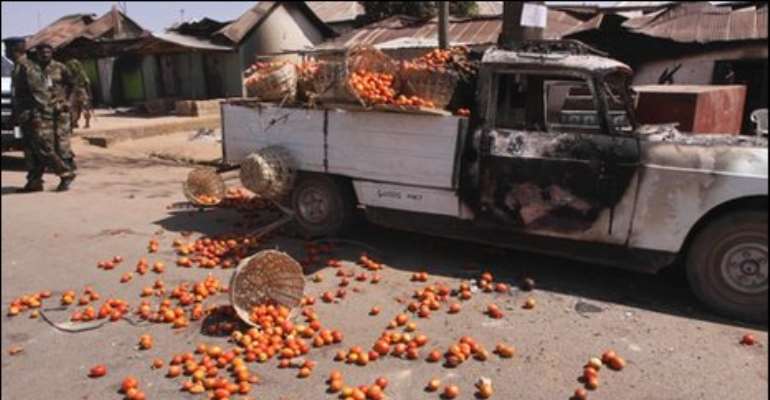Nigeria curfew relaxed after religious fighting in Jos

Nigerian authorities have relaxed the 24-hour curfew in the central city of Jos, where fighting between Muslims and Christians has left hundreds dead.
Army chief Lt Col Shekari Galadima said he was satisfied the violence which began on Sunday had been halted.
Officials said easing the curfew would allow people to find food and water and those displaced to return home.
Eyewitnesses say the army is patrolling the streets and people are wary about venturing too far.
At least 265 people are believed to have died in Jos
People can now leave their houses between 1000 and 1700 local time.
The 24-hour curfew has made it difficult to account for the casualties, but at least 65 Christians and 200 Muslims are believed to have died.
At least 5,000 people fled the violence, using army barracks and public buildings as temporary accommodation.
Barricades
"I feel relatively safer because I'm not hearing any gunshots," one resident, who asked to remain anonymous, told the BBC's Network Africa programme on Thursday morning.
Jos resident |
"It's only the military vans and police cars that you see moving up and down. And there are barricades - every road has been blocked."
The Red Cross said its workers had begun to treat the wounded on Wednesday, the first day aid workers were able to enter the city under the protection of the security forces.
Meanwhile, the BBC received reports on Wednesday that there was trouble in the town of Pankshin, 100km (60 miles) south of Jos.
But Plateau State spokesman Dan Manjang dismissed the accounts from Pankshin as "rumours".
| JOS, PLATEAU STATE |
|
Nigeria's Foreign Minister Ojo Maduekwe told the BBC those behind the violence would be prosecuted.
It is unclear what the trigger was for the latest bout of violence, but there have been reports it started after football match.
Other reports suggested it began after an argument over the rebuilding of homes destroyed in the 2008 clashes.
Jos has been blighted by religious violence over the past decade with deadly riots in 2001 and 2008.
The city is in Nigeria's volatile Middle Belt - between the mainly Muslim north and the south where the majority is Christian or follow traditional religions.
Correspondents say such clashes in Nigeria are often blamed on sectarianism.
However, poverty and access to resources such as land often lie at the root of the violence.
